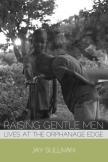Boys' Lives
Readers looking for a nice, conventional story about serving others and how fulfilling that can be must look elsewhere. Jay Sullivan’s Raising Gentle Men: Lives at the Orphanage Edge is real, and serving others is complicated. Sullivan spent two years between undergraduate and law school teaching in Kingston, Jamaica, in the 1980s. But his real Jamaican experience came during his time living at an orphanage for young boys.
The structure of the book is more or less a series of vignettes about life at the orphanage and Jay’s desperate attempts to understand God’s will for him. Jamaica in the mid-1980s suffered from high crime rates and even higher poverty. Jay lives and volunteers at Alpha Boys School—an orphanage run by a selfless group of nuns—dedicated to serving abandoned or abused boys.
Reading Jay’s story is a lot like his journey: often without clear direction. We don’t always have a full picture of the characters, and some stories that seem to be teetering on the revelatory then fall short. As time and pages pass, though, it becomes clear that that is exactly the lesson Jay wants to teach us.
While he gives us glimpses of the boys’ lives, the lack of complete understanding and insight reminds us of Jay’s struggle to really know what these young men go through and how to reach them; Jay admits: “I would never truly be a part of the orphanage; I would exist only on its periphery.”
Sullivan’s description of the seemingly mundane brought a smile to my face. Serving abroad is not all rainbows and sunshine. You might never have hot water, and you will probably eat a bug at some point after becoming too lazy to pick all the critters out of your sugar. Don’t get me wrong, Sullivan romanticizes some aspects of his days in Kingston, but he also reminds us that life does not stop because we’ve decided to go on a service trip. I was drawn by the honesty of Jay’s experience. I just wish he’d cut himself some slack once in a while!
Jay’s head is sometimes stuck in the clouds, as is true of many of us who have spent time in service overseas. Writing the story 20 years later, Jay portrays his younger self as a bit self-deprecating and full of doubt. Thankfully, he peppers in some reality checks from the sweet sisters and pragmatic co-worker Irene, from whom I wish I heard more. The sisters serve as a perfect representation of Jay’s time in Jamaica: “You just did it. It was your calling. It was the life I chose. You left your family. You left your home. You joined a new family and went where you were told. Would you please pass the marmalade,” Sister Magdalen reveals to Jay. That’s right: words of wisdom, followed by a plea for some jam. Just when Jay gets too caught up in discovering God’s purpose for himself, the sisters guide him back to the reality of the moment. Irene is not so gentle. She tells Jay, “I think you’re full of crap.”
Jay’s story is not full of dramatic, life-altering events. He doesn’t save a child from a burning building or convert a village to Catholicism. He’s not even sure he sees the fruits of his two years spent serving others in Jamaica. And yet, the story is perfect. Sometimes we forget that serving others does not exempt us from cleaning the bathroom. Too often, we have painted flowery pictures of far-away lands where our good deeds make tangible differences, where we have “Aha!” moments. Of course, the boys needed stability, a father figure and emotional support. But sometimes, they just needed string to make a kite. Sometimes they just needed a ride home. Sometimes they just needed a game of checkers.
The power of Jay’s story is in the small details: a bed-time story, a brief moment holding hands. And isn’t that the lesson for us all when searching how to serve others? We shouldn’t underestimate God’s power to work in small ways. Remember the mustard seed?
This article also appeared in print, under the headline “Boys' Lives,” in the October 7, 2013, issue.








